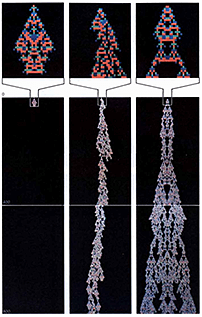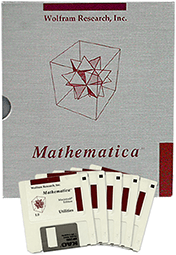About Stephen Wolfram
Stephen Wolfram is the creator of Mathematica, Wolfram|Alpha and the Wolfram Language; the author of A New Kind of Science; the originator of the Wolfram Physics Project; and the founder and CEO of Wolfram Research. Over the course of more than four decades, he has been a pioneer in the development and application of computational thinking—and has been responsible for many discoveries, inventions and innovations in science, technology and business.
 Born in London in 1959, Wolfram was educated at Eton, Oxford and Caltech. He published his first scientific paper at the age of 15, and had received his PhD in theoretical physics from Caltech by the age of 20. Wolfram's early scientific work was mainly in high-energy physics, quantum field theory and cosmology, and included several now-classic results. Having started to use computers in 1973, Wolfram rapidly became a leader in the emerging field of scientific computing, and in 1979 he began the construction of SMP—the first modern computer algebra system—which he released commercially in 1981.
Born in London in 1959, Wolfram was educated at Eton, Oxford and Caltech. He published his first scientific paper at the age of 15, and had received his PhD in theoretical physics from Caltech by the age of 20. Wolfram's early scientific work was mainly in high-energy physics, quantum field theory and cosmology, and included several now-classic results. Having started to use computers in 1973, Wolfram rapidly became a leader in the emerging field of scientific computing, and in 1979 he began the construction of SMP—the first modern computer algebra system—which he released commercially in 1981.
In recognition of his early work in physics and computing, Wolfram became in 1981 the youngest recipient of a MacArthur Fellowship. Late in 1981 Wolfram then set out on an ambitious new direction in science aimed at understanding the origins of complexity in nature. Wolfram's first key idea was to use computer experiments to study the behavior of simple computer programs known as cellular automata. And starting in 1982, this allowed him to make a series of startling discoveries about the origins of complexity. The papers Wolfram published quickly had a major impact, and laid the groundwork for the emerging field that Wolfram called complex systems research.
 Through the mid-1980s, Wolfram continued his work on complexity, discovering a number of fundamental connections between computation and nature, and inventing such concepts as computational irreducibility. Wolfram's work led to a wide range of applications—and provided the main scientific foundations for such initiatives as complexity theory and artificial life. Wolfram himself used his ideas to develop a new randomness generation system and a new approach to computational fluid dynamics—both of which are now in widespread use.
Through the mid-1980s, Wolfram continued his work on complexity, discovering a number of fundamental connections between computation and nature, and inventing such concepts as computational irreducibility. Wolfram's work led to a wide range of applications—and provided the main scientific foundations for such initiatives as complexity theory and artificial life. Wolfram himself used his ideas to develop a new randomness generation system and a new approach to computational fluid dynamics—both of which are now in widespread use.
Following his scientific work on complex systems research, in 1986 Wolfram founded the first journal in the field, Complex Systems, and its first research center. Then, after a highly successful career in academia—first at Caltech, then at the Institute for Advanced Study in Princeton and finally as Professor of Physics, Mathematics and Computer Science at the University of Illinois—Wolfram launched Wolfram Research, Inc.
 Wolfram began the development of Mathematica in late 1986. The first version of Mathematica was released on June 23, 1988, and was immediately hailed as a major advance in computing. In the years that followed, the popularity of Mathematica grew rapidly, and Wolfram Research became established as a world leader in the software industry, widely recognized for excellence in both technology and business. From its beginnings as a technical computing system, Mathematica has grown dramatically in scope over the years—and over the course of more than three decades, it has been responsible for many important inventions and discoveries in a vast range of fields and industries, as well as being a central tool in the education of generations of students.
Wolfram began the development of Mathematica in late 1986. The first version of Mathematica was released on June 23, 1988, and was immediately hailed as a major advance in computing. In the years that followed, the popularity of Mathematica grew rapidly, and Wolfram Research became established as a world leader in the software industry, widely recognized for excellence in both technology and business. From its beginnings as a technical computing system, Mathematica has grown dramatically in scope over the years—and over the course of more than three decades, it has been responsible for many important inventions and discoveries in a vast range of fields and industries, as well as being a central tool in the education of generations of students.
 In 1991, Wolfram began to divide his time between Mathematica development and scientific research. Building on his work from the mid-1980s, and now with Mathematica as a tool, Wolfram made a rapid succession of major new discoveries. By the mid-1990s his discoveries led him to develop a fundamentally new conceptual framework, which he then spent the remainder of the 1990s applying not only to new kinds of questions, but also to many existing foundational problems in physics, biology, computer science, mathematics and several other fields.
In 1991, Wolfram began to divide his time between Mathematica development and scientific research. Building on his work from the mid-1980s, and now with Mathematica as a tool, Wolfram made a rapid succession of major new discoveries. By the mid-1990s his discoveries led him to develop a fundamentally new conceptual framework, which he then spent the remainder of the 1990s applying not only to new kinds of questions, but also to many existing foundational problems in physics, biology, computer science, mathematics and several other fields.
After more than ten years of highly concentrated work, Wolfram finally described his achievements in his 1200-page book A New Kind of Science. Released on May 14, 2002, the book was widely acclaimed and immediately became a bestseller. Its publication has been seen as initiating a paradigm shift of historic importance in science, with new implications emerging every year.
A New Kind of Science included or stimulated a host of specific discoveries including the simplest axiom system for logic and the simplest universal Turing machine.
 Building on Mathematica and the ideas of A New Kind of Science, Wolfram embarked on a still more ambitious project: constructing a system that would make as much of the world's knowledge as possible immediately computable and accessible to everyone. The release of Wolfram|Alpha in May 2009 was widely regarded as a historic step that has defined a new dimension for computation and artificial intelligence—and is now relied on by millions of people every day to compute answers both directly and through intelligent assistants such as Siri and Alexa.
Building on Mathematica and the ideas of A New Kind of Science, Wolfram embarked on a still more ambitious project: constructing a system that would make as much of the world's knowledge as possible immediately computable and accessible to everyone. The release of Wolfram|Alpha in May 2009 was widely regarded as a historic step that has defined a new dimension for computation and artificial intelligence—and is now relied on by millions of people every day to compute answers both directly and through intelligent assistants such as Siri and Alexa.
 In 2014 Wolfram made another breakthrough, building on Mathematica and Wolfram|Alpha to create the Wolfram Language. Based on the unprecedentedly deep technology stack that Wolfram has developed over the course of three decades, the Wolfram Language introduces the new concept of a full-scale computational language, that integrates immense knowledge about computation and the world to allow a new level of computational description and automation, that can serve as the foundation of a vast range of new computation-based fields.
In 2014 Wolfram made another breakthrough, building on Mathematica and Wolfram|Alpha to create the Wolfram Language. Based on the unprecedentedly deep technology stack that Wolfram has developed over the course of three decades, the Wolfram Language introduces the new concept of a full-scale computational language, that integrates immense knowledge about computation and the world to allow a new level of computational description and automation, that can serve as the foundation of a vast range of new computation-based fields.
Based on both his practical and theoretical thinking, Wolfram has emerged as an authority on the implications of computation and artificial intelligence for society and the future, and the importance of computational language as a bridge between the capabilities of computation and human objectives.
 Wolfram has been involved with education for many years, founding the Wolfram Summer School in 2003, and in 2015 publishing An Elementary Introduction to the Wolfram Language to introduce young students and others to modern computational thinking. Long interested in history
Wolfram has been involved with education for many years, founding the Wolfram Summer School in 2003, and in 2015 publishing An Elementary Introduction to the Wolfram Language to introduce young students and others to modern computational thinking. Long interested in history  and in people and their trajectories, Wolfram published a collection of essays entitled Idea Makers in 2016 giving his personal perspectives on the lives and ideas of a variety of notable people, and one in 2019 called Adventures of a Computational Explorer about his own trajectory and intellectual adventures.
and in people and their trajectories, Wolfram published a collection of essays entitled Idea Makers in 2016 giving his personal perspectives on the lives and ideas of a variety of notable people, and one in 2019 called Adventures of a Computational Explorer about his own trajectory and intellectual adventures.
In 2020, building on ideas developed over the course of nearly thirty years, Wolfram announced breakthroughs in finding a fundamental theory of physics, and launched the Wolfram Physics Project to stimulate broad involvement in this ambitious and historic project.
Wolfram has been president and CEO of Wolfram Research since its founding in 1987. In addition to his corporate leadership, Wolfram is deeply involved in the development of the company's technology, personally overseeing the functional design of the company's core products on a daily basis, and constantly introducing new ideas and directions.
Wolfram writes regularly about his activities and thinking on his Stephen Wolfram Writings site.




